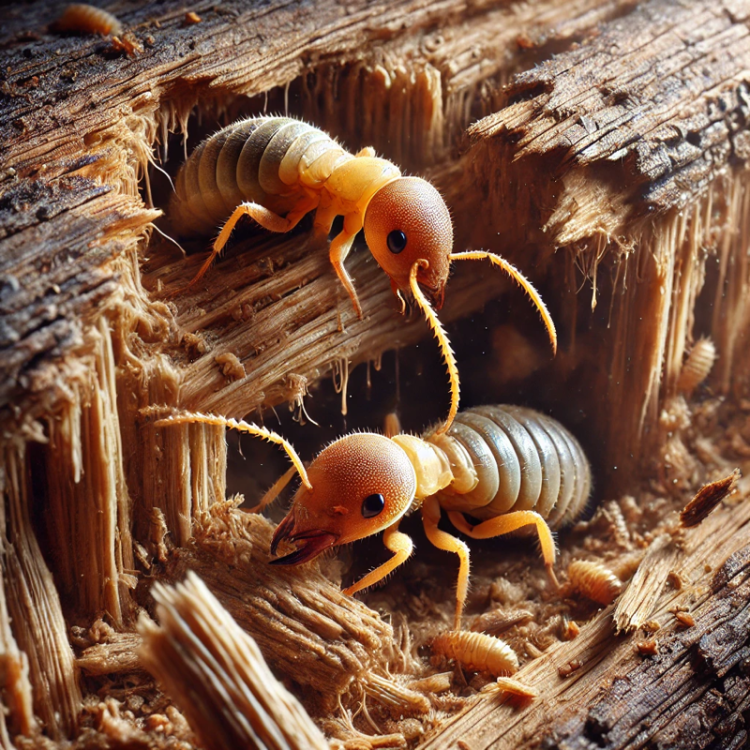Why 90% of Termites Are Essential for Life
When most people think of termites, they picture chewed-up wooden beams, collapsing houses, and costly repairs. But termites are so much more than just destructive pests. In fact, only about 10% of the world’s termite species cause the damage we dislike, while the other 90% are essential for ecosystems to thrive. Let’s dig deeper into the surprising and essential roles termites play in supporting life on Earth.
The 10% We Fear
It’s no surprise that termites have a bad reputation. The species that invade homes and buildings can cause billions of dollars in damage each year, especially in warmer, wetter climates where they thrive. These termites eat cellulose, the main component of wood, and their colonies can quietly wreak havoc before you even notice the damage.
But as problematic as these species are, they represent a small fraction of the more than 2,700 known termite species. The other 90%? They’re hard at work helping the environment.
Nature’s Unsung Recyclers
Most termites live in forests, grasslands, and other natural areas, where they play a crucial role as nature’s cleanup crew. They feed on dead plant material, like fallen trees and decaying leaves, breaking it down into smaller pieces. Without termites, these materials would pile up and block new growth, choking the ecosystem.
By decomposing this organic matter, termites return nutrients to the soil. This enriched soil allows plants to grow strong and healthy, supporting everything from towering trees to delicate wildflowers. It’s a cycle of life that ensures ecosystems remain balanced and productive.
Ecosystem Engineers
Some termites go beyond recycling—they build. Termite mounds, especially in dry regions like savannas, create homes for other creatures and improve the land around them. By digging underground tunnels and constructing towering mounds, termites:
• Aerate the Soil: Their digging creates spaces for air and water to move through the soil, making it easier for plants to grow.
• Store Water: In arid regions, termite mounds act like sponges, holding moisture that helps plants survive dry seasons.
• Foster Biodiversity: Animals often use termite mounds as shelters, and the fertile soil around them attracts a wide range of plants and insects.
Termites transform harsh landscapes into thriving ecosystems, earning them the nickname “ecosystem engineers.”
A Global Impact
The work of termites extends beyond their local environments. When they decompose organic material, termites release carbon dioxide and methane into the atmosphere. While these gases are often linked to climate concerns, termites’ overall contribution is part of a balanced natural process that recycles nutrients and sustains life.
Their impact on global systems shows how interconnected and delicate life on Earth is—each species, no matter how small, plays its part.
Balancing the View
Understanding termites means seeing both sides of the story. The small percentage of species that damage homes can be devastating, but the vast majority of termites are indispensable for the health of our planet. They recycle waste, build thriving habitats, and enrich the soil that feeds our plants. Without termites, ecosystems would suffer greatly, and life as we know it would be much harder.
Jehovah’s Remarkable Design
Termites reveal the balance and complexity of Jehovah’s creation. Proverbs 30:24-25 says, “The ants are not strong creatures, yet they prepare their food in the summer.” Like ants, termites demonstrate remarkable foresight and organization. Their contributions remind us of the wisdom and interconnectedness embedded in all forms of life. Each tiny termite is part of a bigger plan, showing how Jehovah’s creation works together in harmony.
Sources
1. Smithsonian National Museum of Natural History: Termites and their ecological roles.
2. National Geographic: Termite mounds and their impact on ecosystems.
3. Journal of Ecology: Contributions of termites to nutrient cycling and soil structure.
4. Scientific American: Termites’ role in the global carbon cycle.
5. University of Florida Entomology Department: Termites as ecosystem engineers.
6. Purdue University: Economic impact of termite damage.
7. Environmental Biology of Fishes (Journal): Termite-driven nutrient hotspots.
8. Encyclopedia Britannica: Termite species diversity and behavior.
9. U.S. Department of Agriculture: Termites and their role in forest health.
10. New World Translation of the Holy Scriptures: Proverbs 30:24-25.
Thank you to John @Qpala for the suggestion!
Authors Note: For a small creature, there sure is a lot of information out there about them.
Edited by dljbsp
-
 2
2
-
 1
1
-
 2
2

2 Comments
Recommended Comments
Join the conversation with your brothers and sisters!
You are posting as a guest. If you are already a member, sign in now to post with your existing account.
Note: Your post will require moderator approval before it will be visible.